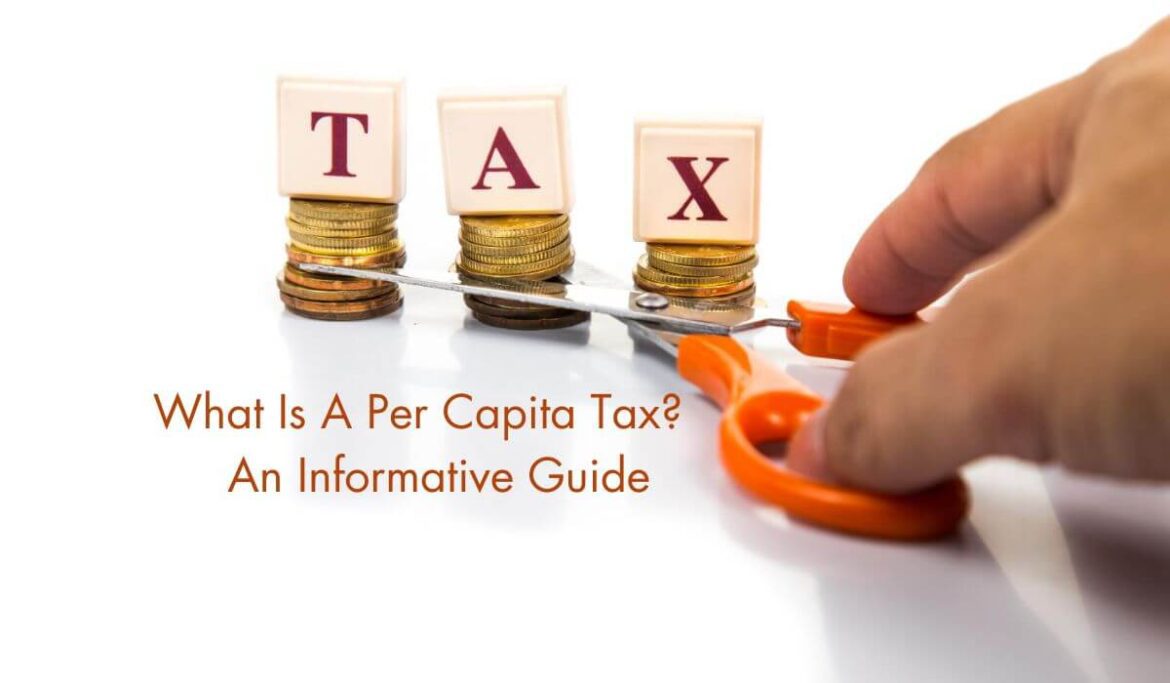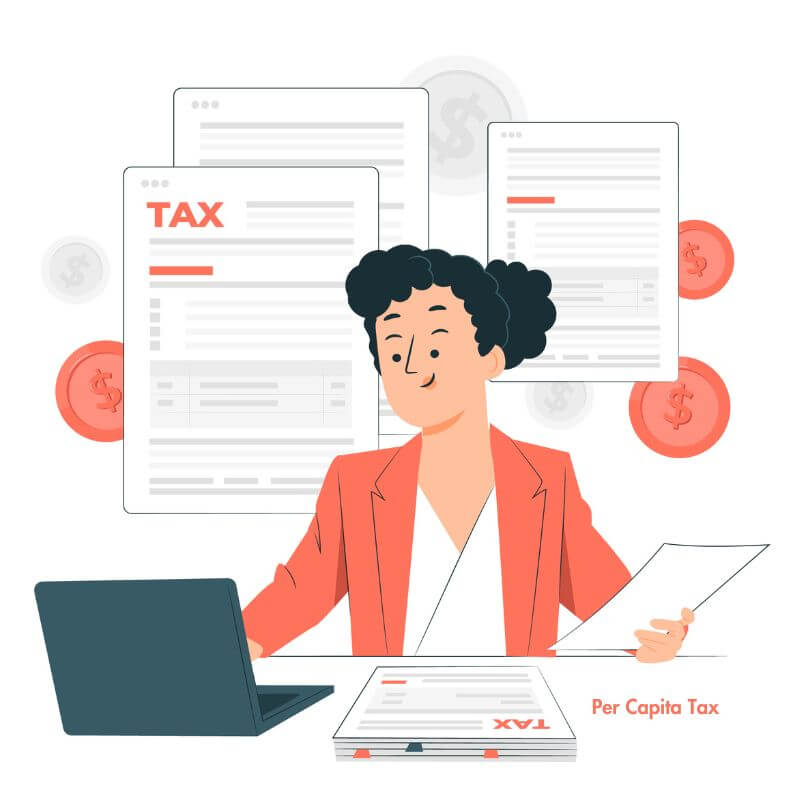Last Updated on December 22, 2024 by Amrita Das
Want to learn about per capita taxes? Then read this guide, here I will tell you in detail about this tax to help you understand all. Discover what per capita tax is, and how it operates, and explore other key insights related to this topic.
 What Is A Per Capita Tax?
What Is A Per Capita Tax?
Per capita taxes are a type of tax levied by local taxing authorities to all individuals over the age of 17 residing in their jurisdiction.
This tax is commonly referred to as a head tax, as it is calculated on a per-person basis rather than being based on property ownership or school attendance.
It is important to note that per capita taxes are separate from other types of taxes, such as earned income tax and local services tax. The billing cycle for per capita taxes varies depending on the taxing authority.
For township or borough per capita taxes, the billing cycle runs with the calendar year and bills are typically received at the end of January.
For school district per capita taxes, the billing cycle runs from July 1st to June 30th and bills are typically received at the end of July. It is important to keep in mind that for new residents, the billing cycle may differ for the first year.
Understanding and staying informed about per capita taxes can help avoid any issues and ensure that they are paid in a timely manner.
Who Is Responsible For Per Capita Tax?
As these taxes are a form of taxation that is levied on all adult residents within a taxing authority, regardless of their property ownership or parental status.
This means that even if you do not own a home or have children in school, you are still obligated to pay the per capita tax. These taxes are typically imposed by both the municipality and school district, with two payments being due each year.
As long as you are an adult resident within the designated taxing area, you will be responsible for paying this tax.
It is important to keep in mind that these taxes are based on residency rather than other factors such as property ownership or parental status, making it a fair and equitable form of taxation for all individuals within the community.
So, if you are an adult living within a taxing authority, it is important to be aware of and fulfill your obligations for per capita taxes.
How Do I Pay This Bill?
When it comes to paying your bill, there are a variety of convenient options available to you.
If you prefer to use your mobile device, simply download BerkApp from the app store and follow the prompts to make payment using your account number, bill ID, and zip code.
You can also pay online by credit card or bank account through the online payments page. Just select the appropriate payment option and follow the steps provided.
Please note that there is a 3rd party fee applied to electronic payments. If you prefer to pay over the phone, simply call a designated number and make a credit card payment.
Again, a 3rd party fee may apply. For those who prefer traditional methods, you can always mail in your payment by sending a money order or personal check along with your bill stub(s) to the designated PO Box.
What Should I Do If Any Errors Occur In Tax Bill?
It is crucial to pay attention to any errors on your per capita tax bill, such as misspellings or duplications. If you notice any mistakes, it is important to contact your local elected tax collector to ensure that they are corrected.
Additionally, if you are no longer a resident of the taxing authority, it is important to inform the collector to have your name removed from the per capita tax rolls.
What Happens If I Don’t Pay Per Capita Tax?
If you fail to pay your tax by the due date, your taxes will be considered delinquent. This means that it will be forwarded to a designated delinquent tax collector for collection, which in many cases is the York Adams Tax Bureau.
The bureau is responsible for collecting these unpaid taxes on behalf of municipalities and school districts in York and Adams Counties.
If you receive a notice from this office regarding delinquent per capita taxes, it is important to contact their Taxpayer Services Department immediately at (717) 845-1584.
Failure to pay these delinquent taxes can result in penalties and further legal action being taken against you. It is crucial to stay up-to-date with all tax payments to avoid any issues or consequences.
What Should I Do If I Receive A Delinquent Notice? How Can I Make Payment For Delinquent Tax?

If you receive a delinquent notice for unpaid taxes, it is important to take action as soon as possible. The first step in resolving this issue is to determine the amount owed and the deadline for payment.
You can find this information on the delinquent notice itself or by contacting your local tax office.
Once you have determined the amount owed, there are several options for paying delinquent taxes. One option is to pay online through Official Payments.
This convenient method allows you to make secure payments from your computer or mobile device. Simply visit their website, enter your tax ID number and payment information, and submit your payment.
Another option is to pay in person at your local tax office. Many offices have designated drop boxes where you can submit your payment and avoid waiting in line. Some offices may also accept payments over the phone or through the mail.
Understanding Exoneration From Tax
Being exempted or exonerated from tax is a privilege that can provide relief to individuals who are facing financial hardships. It is important to understand the process of obtaining exoneration and the criteria that must be met in order to qualify.
Contacting Your Tax Collector
The first step in finding out if you can be exonerated from tax is to contact your local tax collector.
It is important to note that the criteria for exoneration may vary depending on your location, so it is best to consult with your specific tax collector for accurate information.
They will be able to provide you with detailed instructions and any necessary forms that need to be filled out.
Reasons For Exoneration
There are several reasons why an individual may be granted exoneration from tax. One common reason is low income, which can make it difficult for individuals to pay their taxes.
In this case, the tax collector may review your financial situation and determine if you qualify for exoneration. Other circumstances that may lead to exoneration include being on active duty military or having a permanent disability.
These situations can make it challenging for individuals to fulfill their tax obligations, making them eligible for exoneration.
Filing For Exoneration
Once you have identified a possible reason for exoneration, you will need to fill out the necessary forms provided by your tax collector.
It is important to provide accurate and detailed information in order to increase your chances of being approved for exoneration.
It is also important to keep in mind that the process of obtaining exoneration may take some time. It is best to start the process early and be patient while your tax collector reviews your case.
Who Must File PA Income Tax?
To determine if you are required to file a PA income tax return, there are a few key factors to consider.
As a resident of PA, you must file a tax return if your gross taxable income for the year exceeds $33, regardless of whether or not any taxes are due. This includes all forms of income, such as wages, salaries, tips, and self-employment earnings.
Additionally, if you have incurred losses from any transactions as an individual, sole proprietor, or partner in a partnership during the year, you will also need to file a tax return.
It is important to carefully review your income and financial activities throughout the year to determine if you meet these requirements for filing a PA income tax return.
So be sure to keep accurate records and consult with a tax professional if you are unsure about your filing status.
Do Mortgage Companies Include Per Capita Tax In Escrow Accounts?
It is important to note that mortgage companies do not include these taxes in escrow accounts, as they are not attached to the property like other taxes.
If you mistakenly forward your tax bill to your mortgage company, it is important to contact your local elected tax collector for replacements and ensure that the bill is paid on time.
What If I Move Before The Tax Bill Is issued?
If you have recently moved out of your residence before the tax bill was issued, it is important to inform the tax collector’s office as soon as possible.
In order to ensure accurate billing and avoid any potential issues, please return the bill to the tax office along with documentation of your new residence.
This could include a copy of your driver’s license, a utility bill, or even a tax notice from your new residence.
By providing this information, you can help them update their records and ensure that the tax bill is sent to the correct address in the future. Additionally, you have the option to respond online, making it even easier to inform them of your recent move.
Is There Any Difference Between Per Capita And Occupational Assessment?

Per Capita
I gave the idea of capita tax at first, but since I am going to discuss a difference here, let’s go into a little more detail again. However, this tax is a type of tax that is levied on all residents within a given jurisdiction, regardless of their occupation or income level.
This means that every person, regardless of their job title or salary, is taxed at the same rate set by the local government.
The word “capita” literally means “by the head”, indicating that this tax is calculated based on each individual rather than any other factor.
The main advantage of capita tax is that it ensures equal distribution of the tax burden among all residents in a community. It also simplifies the taxation process as there is no variation in rates based on occupation or income level.
However, critics argue that such a tax could be regressive, meaning it could have a heavier impact on low-income people than on high-income people.
Occupational Assessment
Occupational assessment, on the other hand, is a tax levied based on an individual’s job title or occupation.
This means that everyone with the same job title or occupation is taxed at the same rate, regardless of their income level or where they live.
The purpose of this type of tax is to generate revenue for local governments by targeting specific occupations that are deemed essential or profitable. For example, there may be a higher occupational assessment for doctors compared to retail workers.
Key Differences
In summary, the key difference between per capita taxes and occupational assessment lies in their basis for calculation.
Per capita tax is levied on all residents at a flat rate set by the local government, while occupational assessment is assessed based on an individual’s job title or occupation.
While both types of taxes have their advantages and disadvantages, they serve different purposes in generating revenue for local governments.
Capita tax aims to distribute the tax burden equally among residents, while occupational assessments target specific occupations to generate additional revenue.
Additionally, capita tax is based on each individual’s residency, while occupational assessment is based on their occupation or job title.
Therefore, these two taxes coexist and complement each other in a fair and efficient taxation system that supports the functioning of local governments.
Read More: Do Amish People Pay Taxes? Explore Step By Step
Common Questions And Answers
Q: What is a local per capita tax?
A: A local per capita tax is a flat rate tax that is payable by all adults residing in a specific jurisdiction. It is not tied to employment or property ownership, and it is due yearly solely based on residency.
This means that anyone over the age of 18 living in the area is required to pay this tax. The amount may vary from year to year but it does not change based on one’s income or assets.
Q: What does per capita mean?
A: Per capita refers to an average measurement per person in a given population. This term is commonly used in economics, business, and statistics to report figures on a per person basis.
It translates literally to “by the head.” So, when discussing data or statistics related to individuals within a larger group, it is important to use the per capita measure for accuracy.
Q: Who pays PA income tax?
A: Pennsylvania personal income tax is paid by both residents and nonresidents, as well as various legal entities such as estates, trusts, partnerships, S corporations, business trusts and LLCs. The tax rate is 3.07% and applies to all taxable income within the state.
This includes individuals who are not subject to federal income tax as well. So if you live or earn income in Pennsylvania, you may be responsible for paying PA income tax.
Q: How is PA tax calculated?
A: Pennsylvania calculates its individual income tax based on a flat rate of 3.07 percent. This means that all residents, regardless of their income level, are subject to this same rate.
It is a simple and straightforward method for determining state taxes in Pennsylvania. So, if you live in Pennsylvania and earn $50,000 per year, you can expect to pay $1,535 in state income tax.
The calculation is simply $50,000 x 0.0307 = $1,535.
Q: Does per capita matter?
A: Per capita information allows for more accurate comparisons between countries with different population sizes.
It provides a clearer picture by considering outliers, unlike aggregate data. This makes it an important factor to consider when analyzing economic and social indicators.
Read More:
- How To Report ERC On Tax Return 1120s?
- How To Pay No Taxes On Rental Income: A Detailed Guide
- Does Section 8 Look at Tax Returns? What You Need to Know
- Short Term Rental Tax Loophole: Maximize Your Tax Savings
- Is Child Support Tax Deductible: An Informative Guide
Conclusion
I hope, now you understand about per capita tax a lot. So, that’s it for this topic and thank you for reading this comprehensive guide.

 What Is A Per Capita Tax?
What Is A Per Capita Tax?